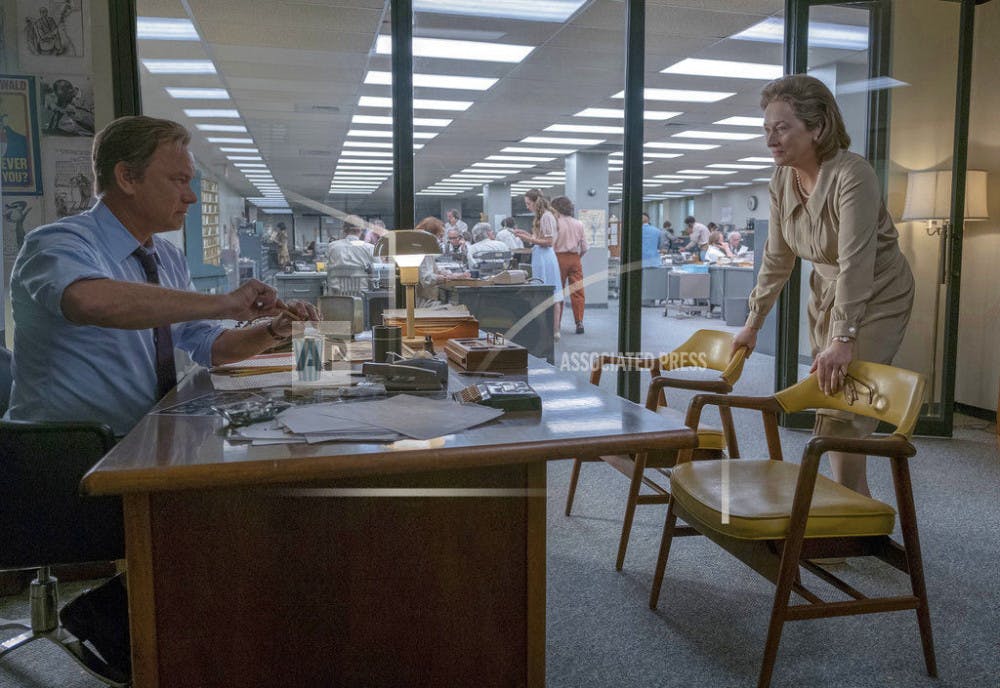Steven Spielberg’s “The Post” serves as a timely reminder that the press must hold their government accountable no matter how much those in power wish to silence them. The film chronicles the paper’s pivotal decision to publish the infamous Pentagon Papers, a study of classified documents that examined U.S. involvement in Vietnam.
In 1967, Secretary of Defense Robert McNamara (Bruce Greenwood) commissioned the study, which discovered that four presidential administrations — Truman, Eisenhower, Kennedy and Johnson — knew the Vietnam War was unwinnable. Despite this, the U.S. escalated involvement in Vietnam to avoid the humiliation of defeat. The information and revelations found in the study were to remain classified until the war’s end.
But in 1969, Daniel Ellsberg (Matthew Rhys), a contributor to the study, became opposed to the war and felt the public deserved to know the study’s results. Ellsberg secretly began photocopying thousands of pages from the study. He then leaked the documents to several newspaper publications in 1971.
This preface is summed up within the first five minutes of the movie, which speaks on the earnestness of “The Post.” The dynamism and pace of the film, rather fittingly, resembles a newsroom scrambling to meet its midnight deadline.
Once “The Post” settles down, the narrative focuses on executive editor Ben Bradlee’s (Tom Hanks) and publisher Katharine “Kay” Graham’s (Meryl Streep) decision on whether to expose the duplicity of the government.
When The New York Times begins publishing excerpts from the Pentagon Papers, Bradlee becomes frustrated that The Washington Post is yet again having to rewrite The Times’ exclusive coverage.
When Nixon’s White House obtains an injunction, forcing The Times to stop printing, Ellsberg contacts The Washington Post and gives national editor Ben Bagdikian (Bob Odenkirk) a copy of the Pentagon Papers to ensure the study continues to be published.
With a copy in hand, Bradlee wishes to establish The Washington Post as a contender to the “newspaper of record.” However, the question of whether to publish or wait for the Supreme Court’s ruling on the constitutionality of the injunction is complicated by a number of factors — one being potential jail time.
“The Post” is not only a story about the importance of protecting the Fourth Estate but also a story of a woman finding her voice. At first, Streep portrays Graham as a woman still coming to terms with the amount of power she holds. While sitting in a room discussing the details of The Post’s impending initial public offering, Streep nervously fidgets and searches for an opportunity to get a word in with her all-male board of directors.
When Kay is forced to make the decision of whether to publish the Pentagon Papers, Streep asserts Kay’s voice when it’s needed most. She sticks by her choice to publish the papers even when all the men around her, albeit Bradlee, insist it will destroy the company.
Hanks truly captures Bradlee’s swashbuckling, endearing nature as the commander of a freewheeling newsroom. Nevertheless, his performance is no match to that of Streep’s layered, vulnerable and subtle portrayal of Graham.
The cast is rounded out by fantastic support including David Cross, Carrie Coon, Pat Healy, Bradley Whitford, Tracy Letts, Sarah Paulson and Alison Brie.
“The Post” serves as a quasi-prequel to “All the President’s Men” (1976) and ends with a closing shot of the Watergate burglary that is indistinguishable from the opening shot of “All the President’s Men.” It seems Spielberg is paying homage to what many agree is one of the best journalism movies to date.
“The Post” is now creating a huge amount of Oscar buzz, but more important than the awards the movie might garner are the messages it delivers.
In this era of “fake news” and “alternative facts,” the notion that the press was meant “to serve the governed, not the governors” is being challenged. “The Post” encourages today’s journalists to continue their work and to deliver the objective truth no matter the cost.
In this image released by 20th Century Fox, Tom Hanks portrays Ben Bradlee, left, and Meryl Streep portrays Katharine Graham in a scene from "The Post." (Niko Tavernise/20th Century Fox via AP)





![Photo of the missing Leachianus “Leachie” gecko. [Photo courtesy of Mike Southwick]](https://snworksceo.imgix.net/ufa/907bd92a-0b29-40eb-a5fb-d7db7cf98b2f.sized-1000x1000.jpg?w=1500&ar=16%3A9&fit=crop&crop=faces&facepad=3&auto=format)
